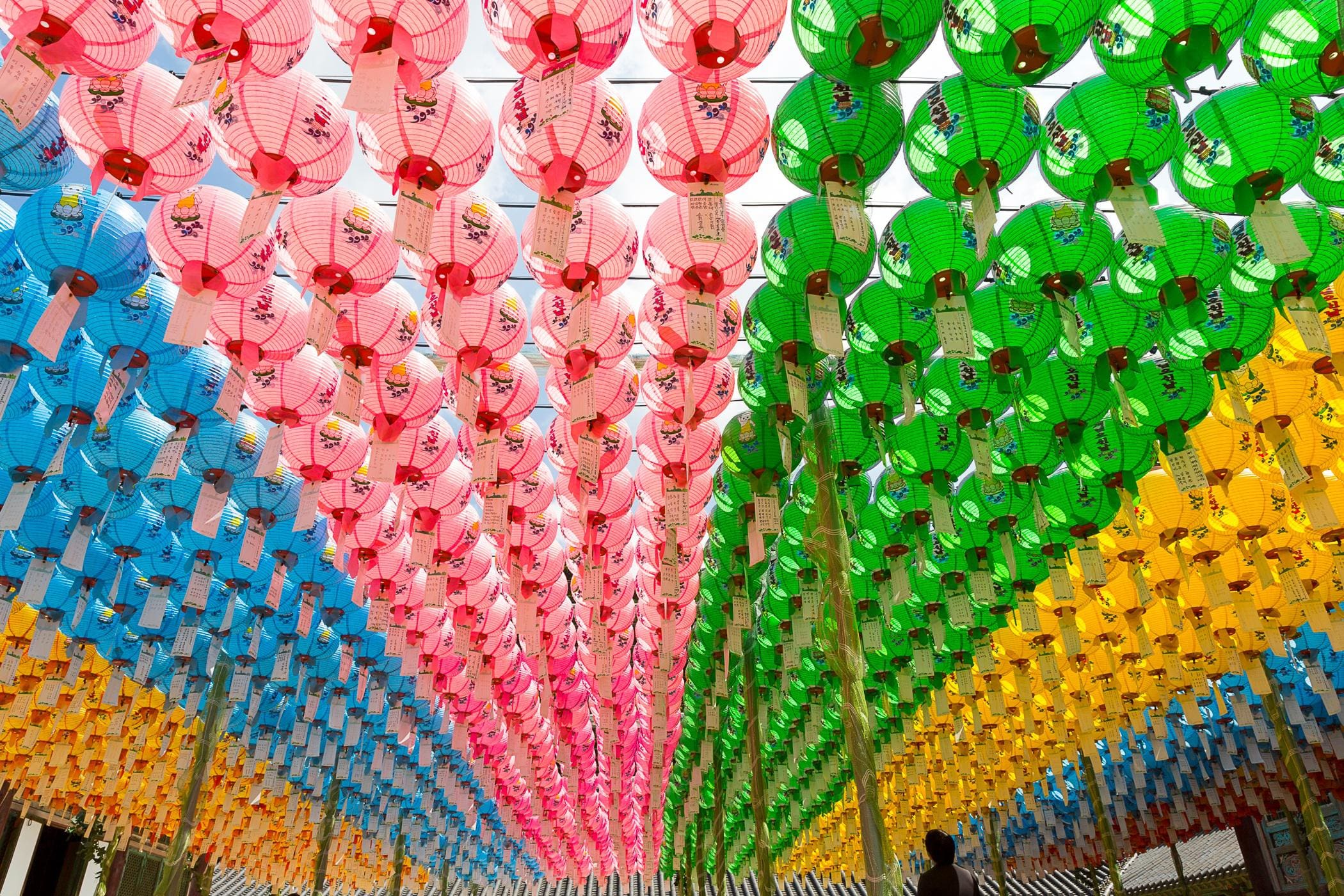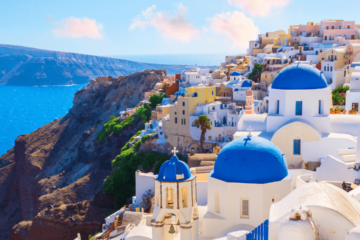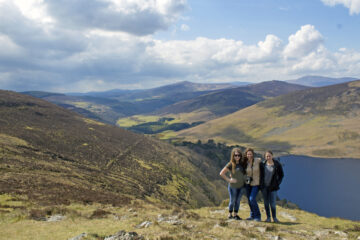Since the 1970s South Korea has experienced tremendous economic growth. Although typical Korean things like Kimchi, Korean BBQ, and K-Pop have become widely known around the world, South Korea still largely remains untouched by mass tourism. Spend your Working Holiday in Korea and you will not only eat delicious food and visit stunning palaces and temples but also make memories that last a lifetime by meeting the friendly Korean people and learning more about their lives and rich East-Asian culture.
LET'S GET STARTED!
Have you ever dreamed of living in South Korea for a longer time, but you don’t know how? This is your chance to make your dream come true… and it’s easier than you think!

What is a “Working Holiday”?
Known as Working Holiday, Work and Travel or Youth Mobility, this visa provides you with the opportunity to receive a work permit for another country without an employer who sponsors you. Most Working Holiday visas are open work permits and therefore, allow you to apply for any job you are interested in. This gives you the amazing chance to work in a foreign country while travelling and gaining international work experience… without spending all your savings!
What are the advantages of GO International’s Korea Program?
South Korea has a very rich culture and special work ethic, which make it an interesting choice as a Working Holiday destination, but also more challenging than the typical English-speaking work abroad country. Thankfully, Go International and its Korean partner will be by your side all the way to create a rewarding and fun experience!
Your Go International Travel Advisor will help you decide which program and destination works best for you and support you from the very first moment until you return to Canada.
You will receive assistance in applying for your Working Holiday visa by checking that your application is correct and complete and by answering all your questions.
For a comfortable start to your Working Holiday in Korea, a team member will meet you at the airport in Seoul and walk you to the train station. You will be picked up at the train station in Daegu and accompanied to the share house.
Our program includes 4-week (28 nights) accommodation in central dorm rooms in Daegu with all amenities provided, such as laundry, wifi, en-suite bathrooms and common areas.
Personal assistance upon arrival, job counselling and preparation for Korean job market.
Partner office in Daegu with bilingual staff to stop by for advice, discounts or simply a chat.
Guest House in Daegu
After a long flight from Canada to South Korea, accompanied by some initial nervousness about your upcoming adventure, you probably just want to sleep off your jet lag. Thankfully, our Working Holiday Program includes 1 month of accommodation in a central guest house in Daegu. The guest house is just a 3-minute walk from the metro station and within walking distance of many bars, clubs, shops, malls and the main shopping street.
The guest house offers dorm rooms (6-share) and double rooms that you can book for a small extra fee. All rooms have en-suite bathrooms with toilets and showers, heating and AC. You will be provided with towels, sheets, toilet paper, shower gel, shampoo, toothpaste and hair dryer if needed. Also available will be a communal kitchen, communal area, washing machine for free use including detergent, beautiful rooftop terrace with garden furniture, reception with local staff during the day, WiFi internet and luggage storage.
Other Optional Services
- 4 weeks of Korean Language Lessons (2 x 90min / week): $270 CAD
- 4 weeks of Korean Language Lessons (5 x 90min / week): $430 CAD
- Upgrade to twin room: $280 CAD
- Package of arrival journey public transportation tickets (KTX Seoul-Dongdaegu, Seoul airport train, Daegu Subway, incl. returnable deposit of magnetic card)
- Pre-arranged hospitality/childcare/education job placement: $500 CAD
Step-by-step guide on how to apply for your Working Holiday visa and check if your application is complete
Personal support by our Go International travel advisors prior to your departure
4 weeks (28 nights) of accommodation in dorm rooms (4-8 share) in guesthouse in Daegu. They have toilets and showers on each floor.
Meet & Greet at Incheon Airport (Seoul) and accompaniment to the train station to Daegu.
Pick-up from Daegu rail station and escorted to the guesthouse.
Personal assistance upon arrival (including Alien Registration Card, resident registration, tax number, registration for public health system, pension fund, pre-paid SIM card, bank account…)
Job Counselling Session about working in Korea (ca. 2 hours) and personal job support
Individual resume preparation and translation for Korean market
Walk-in support in Daegu office and online via KakaoTalk
24/7 emergency number
Bilingual contact person in Daegu (English and Korean)
What’s not included:
Airfare and transport within Korea
Korean Language Lessons
Visa fees and cost for application documents (CA$117 as of November 2024)
Personal Expenses
Travel Health Insurance (mandatory)
TO BE ELIGIBLE FOR THE KOREAN WORKING HOLIDAY VISA:
-
- Be a Canadian citizen with a valid Canadian passport (valid for at a minimum six months past the end date of the visit)
- Be between 18 and 35 years of age (inclusive) at the time of application
- Reside in Canada when you apply for this visa and when your visa is granted
- Provide proof of sufficient funds to support yourself for the initial period of your holiday (minimum KRW 3,000,000)
- Have a return ticket or proof of sufficient funds to purchase one
- Not have previously entered Korea on a working holiday visa
- Not have a criminal record
- Must submit fees (IN CASH) for visa along with your application form (check visa fee information on the embassy website)
- Not be accompanied by any dependents at any point in time during your stay in Korea
- Must hold health insurance for the duration of your stay in Korea
** Note: Canadians can participate in the Korean Working Holiday program twice for up to 24 months per participation and can work up to 40 hours a week. Our English Education Assistant program provides job placement that is up to 25 hours per week.
Top 5 Places to Visit in South Korea
SEOUL
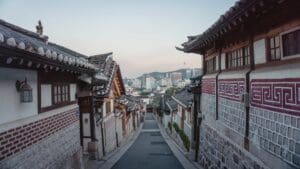
True to its official name “Seoul Special City”, Seoul is full of fun surprises and therefore, one of the top city trip destinations in East Asia!
The capital of South Korea is a huge metropolis where modern skyscrapers, high-tech subways and pop culture meet Buddhist temples, impressive palaces, and bustling street markets. Notable attractions include the futuristic Dongdaemun Design Plaza (a convention hall with curved architecture), a sprawling rooftop park named Sky Gardens, the famed Gyeongbokgung Palace, which once had more than 7,000 rooms and Jogyesa Temple, a site of ancient locust and pine trees.
GYEONGYU
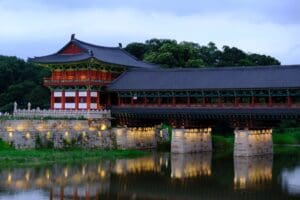
Gyeongju served as ancient capital for the Silla Kingdom for over 1,000 years and is therefore often referred to as “the museum without walls”, full of historical wonders. Among the treasures are the Seokguram grotto and Bulguksa temple, both designated as the earliest UNESCO World Heritage sites in South Korea.
With all the cultural and historical richness of the region, Gyeongju is a major tourist destination for both locals and foreign visitors and a fantastic day trip from Busan. For such a rather small area, you will find there more tombs, rock carvings, palace ruins and temples than in any other place in South Korea.
JEJU ISLAND
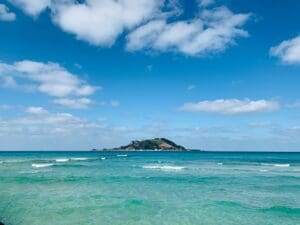
Jeju Island, the largest island in South Korea, located in the Korea Strait, is a picture perfect. It is widely known for its beach resorts and volcanic landscape of craters and cavelike lava tubes. Hallasan Mountain, a dormant volcano, features hiking trails, a blue crater lake at the 1,950m summit and the nearby Gwaneumsa Temple. Visit the 7km-long Geomunoreum Lava Tube System for dramatic views of the dark-colored lava walls and carbonate decorations.
The island is also famous for its haenyeo, female divers who gather abalone (marine snails) and other seafood for up to five hours a day in the cold sea — without scuba gear. You can find the divers’ figurines for sale in the Haenyeo museum on Jeju, which all look like Snow White with goggles.
ANDONG
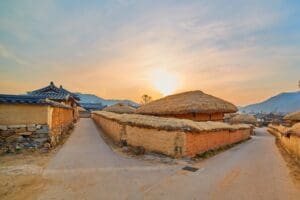
Andong is a charming city along the Nakdong River. It is known for its open-air heritage museums. Andong Folk Museum uses exhibits and re-enactments to explain traditional Korean ceremonies like weddings. Its outdoor area has thatched houses and a pair of carved totem poles. West of the city, Hahoe Folk Village displays tile-roofed homes and the traditional food of the area. Also don’t miss out on Buyongdae Cliff, which offers expansive river views and white sand to relax.
Visit Andong if you want to take a stroll around a peaceful and historical village in South Korea, and don’t miss out on the traditional “mask performance”.
JEONJU
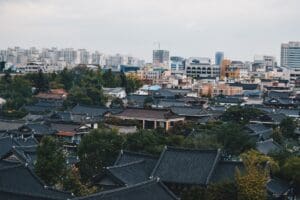
A visit to Jeonju should definitely be on your itinerary for your first trip to East Asia if you want to experience the traditional side of South Korea.
Jeonju literally means “Perfect Region” and is an important tourist center known for its world-renowned food scene and full of culture, history and life. Visit Jeonju Hanok Heritage Village, an area of traditional houses, craft shops and food stalls. In the village, the 15th-century Gyeonggijeon Shrine has portraits of former kings. At the Jeonju Korean Traditional Wine Museum, you can watch a demonstration of how local rice wines are made. Also don’t miss out on a visit to Omokdae and Imokdae, which are centuries-old hilltop pavilions with sweeping views.
You will be provided with a step-by-step guide on how to apply for your Working Holiday visa and we will check if your application is complete.
You will have to hand in your visa application in person at a Korean embassy or consulate of your area (in Vancouver, Ottawa, Toronto or Montreal) or mail it. More information can be found on the embassy website.
From the date of visa issue, you will have a 3 month window to enter Korea. That window will expire after 3 months as indicated on the visa. If that period has passed, you will need to reapply with all the relevant documents, so we do not recommend applying too far in advance.
With a population of 2.5 million, Daegu is South Korea’s third largest city. It is located between Seoul and Busan. The journey time by train to Seoul is 1 hour and 45 minutes and to Busan about 50 minutes.
With 6 major universities and 17 other colleges, Daegu is Korea’s number 1 student city, also attracting many
international students. The atmosphere of downtown Daegu with its bars, clubs, shops and markets as well as the Buk-Gu district is characterized by young, student life. Because of the many students, the cost of living is also significantly cheaper than in Seoul.
Daegu is also an industrial city with manufacturing of electronics, high-tech, and fashion and textile industries, creating job opportunities for Working Holiday participants in light factory work and logistics.
An art scene has developed in Daegu’s Bongsan-dong district. Overall, the city has a young, creative and lively atmosphere. Daegu hosts events and festivals throughout the year such as the Daegu Fashion Fair, the Asian Bodypainting Festival, the Chicken and Beer Festival, the Daegu International Music Festival, Colorful Daegu Festival in May and Daegu International Jazz Festival.
Our package includes 1 month of shared accommodation in a guest house in Daegu, which has two locations, both in the same neighborhood in the middle of Downtown Daegu, just 3 minutes walk to Jungangno Metro Station and within walking distance to many bars, clubs, shops, malls and the main shopping street.
The guest house has dorm rooms (6 to 8-share) and twin rooms (upgrade for an extra cost). The 6-8 bed rooms have en-suite bathroom with toilet and a hot shower. The rooms have heating and air conditioning. Towels, sheets, toilet paper, shower gel, shampoo, toothpaste and hair dryer are provided. At each location there is a communal kitchen, a communal area, washing machine for free use including detergent, rooftop terrace with garden furniture, reception with local staff during the day, Wi-Fi internet and luggage storage.
In Daegu and the surrounding area, there are several large companies such as Samsung and Coupang that hire staff with little or no knowledge of the Korean language for simple jobs such as packing products for shipment, loading and unloading goods, or labeling products.
Such jobs can already be organized during the introductory month. Job start is possible as soon as the Alien Registration Card is issued (takes about 3 weeks). Participants can extend guesthouse accommodation locally.
In rural areas outside of Daegu, various jobs can be organized with companies that receive government funding to stimulate the economy of rural areas.
Participants are supported in finding suitable jobs and given personal tips for a successful application. This happens during the Job Counseling Session and ongoing throughout your whole stay in Korea. Participants must contact the companies themselves and attend a job interview.
As of 2024, Canadian working holiday participants can work up to 40 hours per week. Employment should be viewed as a secondary aspect of the working holiday rather than the primary reason for being in Korea. Some jobs that require a professional license cannot be performed on the Working Holiday Visa, including foreign language teaching and cooking jobs. Learn more on Canada’s IEC website.
Our Korean partner in Daegu will not only support you during your first days of arrival, but throughout the entirety of your stay in Korea. It starts by meeting a team member at airport in Seoul and being escorted to the train station. You will then be picked up at the train station in Daegu and accompanied to your accommodation.
When in need of assistance, simply walk in during office hours, give them a call or send them a message via email or through the app service KakaoTalk. There is also a 24/7 emergency support system in place. You see, our all-round carefree service provides you with the support you need to have the best Work and Travel experience of your life!
It is not mandatory to know any Korean before your arrival and there are some jobs that require little to no knowledge of the language. However, we do recommend booking language classes on arrival in Daegu. Our partner works with the largest language school in Daegu and offers 4-week language courses for beginners to upper intermediate learners, as well as in two intensities (2x or 5x weekly x 90minutes).
In addition to the formal language classes, the language school offers language exchanges twice a week for language students at no additional cost, where participants can teach Koreans English and in exchange practice Korean conversation skills with them.
We encourage participants to put effort into learning the Korean language, which greatly expands the range of available jobs.













